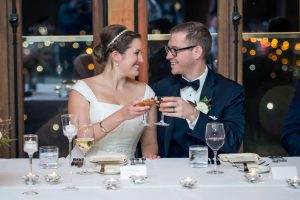Start the Conversation with Your Budget
By Leah Economos
Many brides are surprised that most vendors insist on knowing their budget before providing a detailed proposal. Truth is, this saves you both time and prevents miscommunication, sticker shock and getting attached to an idea you just can’t afford.
Why Share Your Budget?
Because you’re a busy bride with limited spare time, you’ll want this process to be as efficient as possible. Also, the vendors you’re interviewing respect your time and aim to make the proposal process as simple and straightforward as possible. With knowledge of your budget, each vendor will be able to provide a proposal in the price range you have specified.
The Dangers of a Proposal that’s Above Your Budget
A proposal with no budget guideline has several dangers. The first one is sticker shock. Many brides are truly shocked by the cost of wedding elements. Being surprised by your proposal price is not only unpleasant, but it may cause you to eliminate a wedding vendor from consideration who is truly capable of supplying a fantastic alternative for half the price—they just had no idea how much you wanted to spend!
Beyond the sticker shock, there’s another danger: attachment! You’re likely to become attached to all of the beautiful options conjured up in that initial proposal—and they’re way out of your price range. This will only create disappointment down the road as you find it impossible to be satisfied with more budget friendly alternatives.
Your style, taste, and personal preferences are equally as important as your budget. But, if you start out with a proposal that’s above your budget, trimming it down will be the only solution. That will mean parting with some elements you may love, and it also will delay arriving at your “budget happy place” while your salesperson revises your proposal. To avoid this dilemma, simply share your budget with vendors in your first conversation.
Finding a Fit
There’s a possibility that your vision and budget aren’t a match for a particular vendor, and that’s okay! If they aren’t able to offer the service or product you’re looking for within the amount you’re willing to pay, don’t be shy about telling them your budget is firm and you’ll have to look elsewhere.
If you consult several reputable vendors and continue to hear your vision can’t be accomplished within the amount you want to pay, it’s probably an indication your budget isn’t reasonable. Consider shifting money from another category within your overall budget, or open your mind to more budget friendly options that still allow you to have a great event.
Great vendors will do their best to offer an alternative to suit your budget, whether it’s a fabulous short rib small plate station instead of filet mignon, or ranunculus for your bouquet instead of peonies.
Take Steps in the Right Direction
Occasionally, brides can get stuck in what is referred to as ‘proposal la-la land.’ This is what happens when you continue to swoon over Pinterest pictures and celebrity weddings featuring ideas far outside your budget range. Remember, the goal is to arrive at a proposal you’re happy with and can afford.
Trusting Your Vendors
Some couples say they don’t feel comfortable sharing their actual budget with vendors they’re interviewing, for fear that they will “use up all the money,” and I want to offer some insight on that topic. Any vendor you’re considering hiring should make you feel comfortable and cared for as a customer. If at any point you feel pressured in a used-car-salesman-fashion, you’re in the wrong place.
When it comes to budget, remember: you’re in charge. Your florist or caterer isn’t going to reach into your wallet and take your money. When you agree on a price, make sure you’re comfortable with the amount you’re spending.
Bottom Line
You’ll make your planning process easier, avoid disappointment and sticker shock and develop a great relationship with your vendor team by sharing your budget from the beginning.
Budget Breakdown
In Chicago, the average cost of a 150-person wedding is approximately $42,000 with downtown weddings costing more ($51,000) and suburban weddings costing less ($33,000). When you start planning your wedding, one of the very first things you’ll need to create is a budget. The most helpful approach for you, your partner, and your respective families will be to openly discuss how much everyone will be able to contribute. Today, it is not uncommon for the bride and groom to foot the entire bill, or for the families to share the expenses. When discussing your expenses with your loved ones, be sure to remain courteous and realistic.
- RECEPTIONS: 40-45% (Reception venue, food, beverages & rentals)
- PHOTO & VIDEO: 10-20% (Photo & video)
- ATTIRE & WEDDING BANDS: 8-12% (Bride and groom attire & wedding bands)
- FLOWERS: 8-12% (Flowers & décor)
- MUSIC: 5-10% (Ceremony & reception music)
- PLANNING: 0-10% (Planner or coordinator)
- CAKES: 3-6% (Cakes & sweet tables)
- OVER SPEND: 5% (Overspend Fund)
- CEREMONY: 2-4% (Ceremony)
- INVITES: 3-6% (Stationery)
- TRANSPORTATION AND GIFTS: .2-4% (Gifts & transportation)
- BEAUTY: 2-3% (Hair, makeup & pampering)




